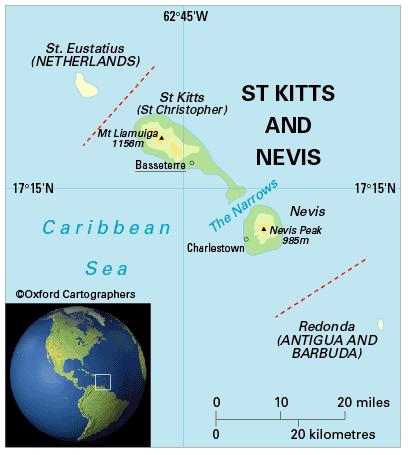Education in St Kitts and Nevis
- Message
- Biography
- Background
Message from the Minister of Education and Information
The Honourable Nigel Carty
 |
The Federation of St. Kitts and Nevis is a twin-island microstate located in the Lesser Antilles (The West Indies) with a population of approximately 50,000 inhabitants, a life expectancy of 72 years, a per capita income of 8000 United States Dollars and a literacy rate of 98 percent. It was the first Commonwealth Caribbean country to introduce free universal secondary education when it did so in 1968. At the pre-primary level (Early Childhood Education), 70 percent of the children are enrolled in formal education. A fundamental goal of education as enunciated in the Education Act (2005) is to provide access to high-quality education for all nationals in institutions that foster the spiritual, cultural, moral, intellectual, physical, social and economic development of the individual and the community.
Although there are a number of denominationally-associated private schools, mainly primary, that offer paid tuition, the greatest achievement of the education system in St. Kitts and Nevis is the existence of a network of free public schools that are highly accessible and reasonably well-resourced. Computer labs, libraries and reading clinics are common in our schools. Students are provided free transport to and from school, and receive free text books. Recently, an initiative was undertaken to provide laptop computers to every secondary school student. Students in primary schools are provided with lunch on a daily basis.
One of the areas of focus is the quality of primary and secondary education. The quality of basic education is impacted by the relatively low percentage (50%) of fully-trained teachers. As a consequence, there are ongoing professional development exercises, clinical supervision, and appraisal for teachers. With a wide disparity in academic achievement between males and females, single sex grouping in a co-educational setting is being investigated with a view to informing educational policy that is geared towards the improvement of the performance of males. With a focus on inclusive education, there is a clear and decisive strategy for the support and further development of special education services.
The Ministry of Education of St. Kitts and Nevis has recently identified the radical improvement of Technical and Vocational Education and Training (TVET) as a major plank of its development strategy and has devised a medium-term plan for this purpose. The demise of the sugar industry in 2005 coupled with economic decline in recent times, has given rise to increased unemployment among the young adult population. Our TVET strategy is designed to reduce unemployment by developing and honing employable skills and boosting entrepreneurship. At-risk youth are a principal target of the strategy.
St. Kitts and Nevis cannot sustain a full tertiary level educational institution at this time. Students attend universities located within the wider Caribbean region, North America and the United Kingdom, principally. This arrangement has impacted the cost of tertiary education and consequently the number of persons accessing it. Herein lays one of the greatest challenges in the education sector. There is however a growing offshore tertiary education sub-sector consisting of medical universities that provide educational services to students from North America predominantly. The sector is well-regulated and local students have been able to access these schools.
Biography of the The Honourable Nigel Carty
 |
The Honourable Nigel Carty has been a Member of Parliament of St. Kitts and Nevis since 2004 and held the position of Minister of State in the Ministry of Finance, Sustainable Development, Information and Technology until 2008 when his appointment was transferred to the Ministry of Education, Labour, Social Security and Technology. In 2010, Minister Carty was appointed to his present position of Minister of Education and Information. Improving Technical and Vocational Education and Training has been one of Minister Carty’s areas of focus over the past two years and he sees the strengthening of TVET as key to reducing unemployment and poverty, and boosting entrepreneurship and livelihoods.
The Hon. Nigel Carty is the Deputy Chairman of the St. Kitts-Nevis Labour Party, a position he has held since 2005. He ascended in politics through his involvement over many years in the youth movement of his political party.
Minister Carty received his formal academic training in Mathematics and Computer Science and is a United States Fulbright Scholar.
Background Information
Joined Commonwealth: 1983
Population: 52,000 (2009)
GDP p.c. growth: 2.5% p.a. 1990-2009Net primary enrolment: 93.7% (2009)
Net secondary enrolment: 88.3% (2009)
Gross tertiary enrolment: 18.4% (2007)
There are 12 years of compulsory education starting at age five, offered by state, private and church schools. Net enrolment ratios are 93.7% for primary and 88.3% for secondary (2009), and the gross enrolment ratio for all levels of education combined is 75.6% (2007). The pupil-teacher ratio for primary is 14:1 and for secondary 10:1 (2009). Some 67% of pupils complete primary school (2007). The school year starts in September.
The Caribbean Examinations Council, established in 1972 by an agreement among 15 English-speaking Commonwealth Caribbean countries and territories, provides examinations and certification at secondary and post-secondary levels. The Caribbean Secondary Education Certificate examination is for students at the end of the secondary education cycle; the Caribbean Advanced Proficiency Examinations for post-secondary students entering the world of work and for those candidates who wish to continue their further education at the tertiary level.
St Kitts and Nevis participates in the regional University of the West Indies, which has campuses in Barbados, Jamaica, and Trinidad and Tobago. The female-male ratio for gross enrolment in tertiary education is 1.05:1 (2008).
In the wider community, which already enjoys a very high level of literacy, the government promotes programmes to improve literacy. It has also launched an initiative to promote ICT skills in rural areas.



